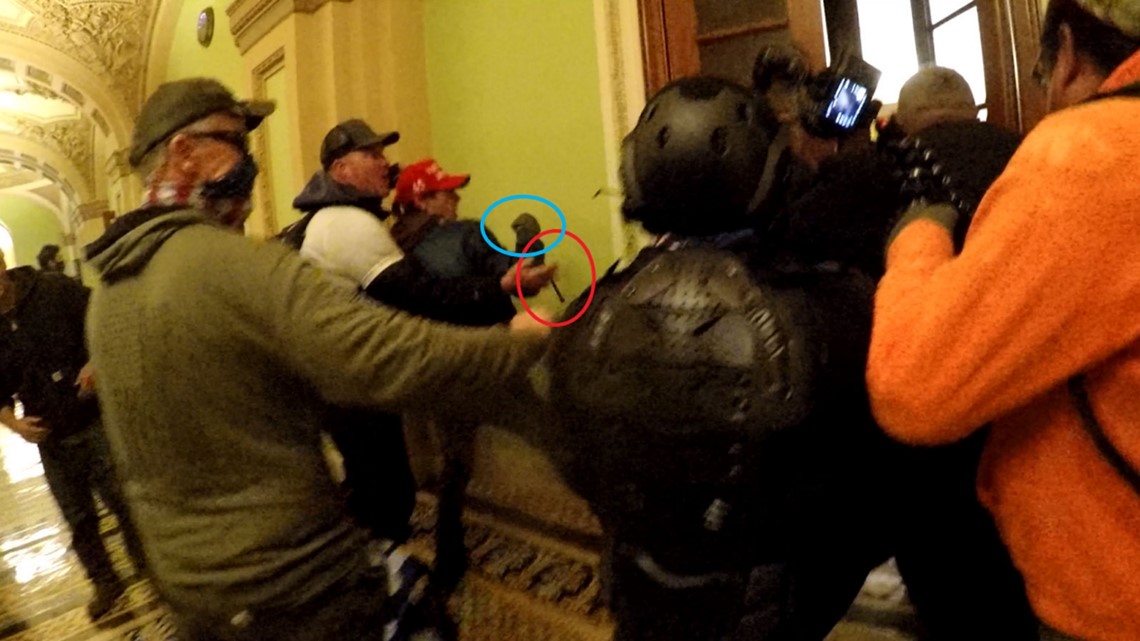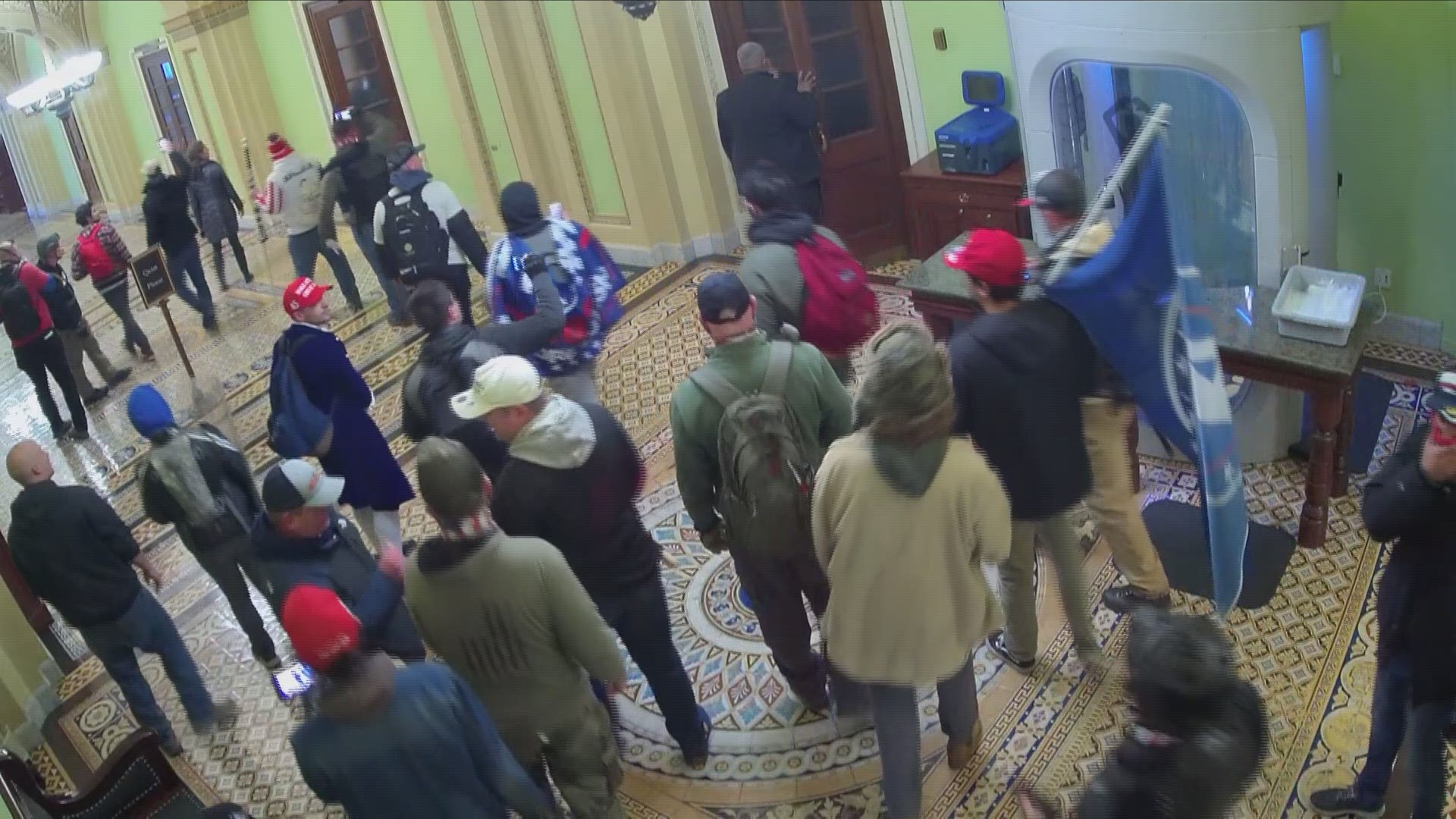WASHINGTON — A Georgia man indicted as one of the youngest defendants in any Jan. 6 case was sentenced Wednesday to a year and a day in prison for participating in the breach of the U.S. Senate Chamber.
Bruno Cua, of Milton, Georgia, was convicted in a stipulated bench trial in February of obstruction of an official proceeding and assaulting a police officer. In exchange, prosecutors agreed to drop other felony charges, including one count for carrying a dangerous weapon – an ASP baton – into the U.S. Capitol.
On Friday, after a nearly six-and-a-half hour sentencing hearing that stretched over portions of two days, U.S. District Judge Randolph Moss ordered Cua to serve 366 days in prison. Moss varied downward significantly from the lower end of the 27-33 months Cua was facing under the advisory guidelines calculated by the judge. Moss said he gave Cua credit for accepting responsibility and for his youth and immaturity on Jan. 6, but that his conduct as a principle participant in the breach of the chamber warranted prison time.
"Your time in the Capitol was relatively brief, but in that time you accomplished a lot of bad," Moss said.


Prosecutors wanted Cua to serve nearly five years in prison. In a sentencing memo, they described how Cua climbed a scaffolding on the west side of the building before aggressively confronting officers on the Upper West Terrace and then leading other rioters into the Rotunda. Cua then assaulted an officer on the third floor of the building who was attempting to lock the doors to the Senate Gallery.
“After the officer retreated, Cua rushed into the Senate Gallery, jumped down to the Senate Floor, and sat in the Vice President’s chair with his feet up on the desk,” prosecutors wrote.
Leading up to Jan. 6, prosecutors said, Cua had contemplated and repeatedly called for violence. In a private message on Dec. 22, Cua told an acquaintance supporters of former President Donald Trump could “storm the freaking senate/house” and should bring guns to D.C. on Jan. 6.
Four days later, Cua wrote: “#PresidentTrump is going through every possible legal process. But #WeThePeople are sick of waiting. We want the blood of politicians split [spilled]. We want to fight. It’s no longer about left or right it’s #tyranny vs. #freedom.”
On Jan. 6 itself, prosecutors said, after leaving the building Cua resumed posting on social media and bragging about his role in the riot. In one message, he wrote, “I’m out and it’s a good thing. We are taking our country back by force.” In another message roughly three hours later, he sent a private message reading, “If Trump doesn’t get Im [sic] we will be back in DC for a blood bath.”
Three days after Jan. 6, Cua sent another message on Instagram saying, “Idc either I want a bloody war I’m ready to start shooting and I’m ready to die before I watch America crash and burn. I’ll be on the front lines. I want to lock the swamp rat tyrants in the capital and burn the place to the ground.”
In a memo filed by his attorney, William Zapf, Cua said he was “deeply remorseful” for the things he’d posted on social media – but said part of their motivation was to grow and monetize his YouTube page.
“While admittedly sharing the beliefs with a large swath of Americans at the time that the 2020 election was ‘stolen’ or fraudulent,” Zapf wrote, “this desire to gain attention and followers on social media was one reason Mr. Cua made such provocative political posts, many of which were not his words originally but were copied and reposted from others.”
His comments, Zapf wrote, appeared to be “driven by an immature need for affirmation and celebrity.”
Zapf’s memo spent considerable time on the role Cua’s parents played in his actions on Jan. 6. They drove him to D.C. and, in his father Joe’s case, told him to carry pepper spray and a baton and allowed him to climb scaffolding to get a better view. According to Zapf, afterward they had a “nauseating, visceral reaction” to seeing images and footage of the riot. Both of Cua's parents spoke during his sentencing hearing Wednesday and submitted letters to the court.
“My heart is heavy and contrite,” Cua’s mother, Alise, wrote in her letter. “Due to our participation on January 6th, my then 18 yo son was found guilty of serious offenses. In the aftermath, in the courtroom of public opinion, many asked: what about the parents? They are correct to ask. Your Honor, I have examined my every decision, failure and thought, in a seeming endless cycle on repeat. I know Bruno bears responsibility for his own words and actions. But Your Honor, so much of it is my own fault.”
Cua also spoke Wednesday. He began by acknowledging he had removed pins to allow doors to the Senate Chamber to be opened. He also said he had falsely believed the 2020 election was stolen and wanted to take responsibility for his actions.
"Everything that happened that day should never be viewed as anything other than an attack on our democracy," Cua said.
Moss said he knew Cua was hoping not to return to prison, but that he would have to accept some "tough medicine" in accordance with the two felony counts he was convicted of. But, Moss said, that wasn't the end of his life.
"I have high hopes for the type of citizen you will be once you pay that debt," Moss told Cua at the end of the hearing.
Moss agreed to allow Cua to self-surrender, and to recommend placement at federal facilities in either Montgomery, Alabama, or Pensacola, Florida. Cua was ordered to remain on his existing conditions of release until given a surrender date by the Bureau of Prisons.

